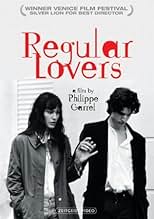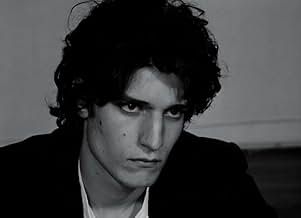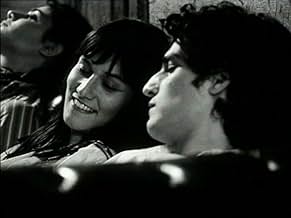Les amants réguliers
- 2005
- 3h 3min
NOTE IMDb
6,8/10
3,1 k
MA NOTE
Ajouter une intrigue dans votre langueAmidst the chaos of student and union protests, 20-year-old Parisian poet François finds himself in legal hot water for dodging a stint in the French military. While at a party, he falls in ... Tout lireAmidst the chaos of student and union protests, 20-year-old Parisian poet François finds himself in legal hot water for dodging a stint in the French military. While at a party, he falls in love with Lilie, a would-be sculptor.Amidst the chaos of student and union protests, 20-year-old Parisian poet François finds himself in legal hot water for dodging a stint in the French military. While at a party, he falls in love with Lilie, a would-be sculptor.
- Réalisation
- Scénario
- Casting principal
- Récompenses
- 7 victoires et 5 nominations au total
Avis à la une
This is the best French movie of the year ! I saw it twice and I found it great both times. I didn't think it boring at all even though it is very long (3 hours). I'm seventeen so I obviously didn't get to live the events of may 1968 that marked an extremely important turn in French history, but it doesn't really matter since I still really enjoyed the film. It's actually quite universal : people of my parents' age can identify to the characters and so can people my age. Garrel seems to perfectly understand young people, the way they think and the complications of love as well as the loss of illusions concerning the possibility of changing the world. Maybe that's because the character played by Louis Garrel (his son)is actually meant to represent Philippe Garrel himself. Well anyway, great movie, no action (have to be honest on that point) but so strong feelings that you can't possibly stay indifferent to it. If you're looking for a relaxing Sunday-evening movie, don't waste your time on this, you'll be disappointed. But if you like cinema, you'll like Les Amants Réguliers which is a bewitching movie close to those made in the 50's and 60's by the Nouvelle Vague artists.
Seeing Les Amants Reguliers calls immediately for comparison with Bertolucci's movie 'The Dreamers', in my opinion the best film made about the 1968 revolt of students in Paris. Actually director Philippe Garrel does not seem to avoid comparing with his much more famous colleague, sharing the principal actor and even including a direct replica eye-in-viewer-eye about an older film of Bertolucci. And yet, LAR is a different film, and an interesting one.
The story line seems also familiar. The movie starts with long scenes of the 1968 'emeutes', maybe among the best done until now. The film is made in black-and-white, and the perspective of the static camera on one side or the other of the barricade reminds Eisenstein. Then, as in The Dreamers, the action moves in the Parisian flat where the heroes of the defeated revolt make art, smoke drugs, dream, and fall for one other. There is no direct social comment, no real explanation of the background of the revolt. The movie focuses on the psychology of the characters and on the love story between the main characters. It's like a premonition of the process of transition to the establishment that the generation of the 1968 went through, it's just that not all the participants may adapt or survive.
The film is more about the characters than about the events. And it is merely for the style it will be remembered about. The black-and-white cinema is memorable not only in the revolution scenes, but also when looking at the characters evolution. Many sequences are enhanced by a technique that is derived from the silent films movies, with long takes accompanied by a off piano tune. The effect is exquisite. Yet the length of the film is hardly justified, it lasts more than three hours and I doubt that cutting it to only two hours would have been a miss - actually I am convinced it's quite a contrary.
Without raising at the depth and subtlety of Bertolucci's movie LAR is another perspective to remember about one of the more important years in the history of France and of the world in the 20th century.
The story line seems also familiar. The movie starts with long scenes of the 1968 'emeutes', maybe among the best done until now. The film is made in black-and-white, and the perspective of the static camera on one side or the other of the barricade reminds Eisenstein. Then, as in The Dreamers, the action moves in the Parisian flat where the heroes of the defeated revolt make art, smoke drugs, dream, and fall for one other. There is no direct social comment, no real explanation of the background of the revolt. The movie focuses on the psychology of the characters and on the love story between the main characters. It's like a premonition of the process of transition to the establishment that the generation of the 1968 went through, it's just that not all the participants may adapt or survive.
The film is more about the characters than about the events. And it is merely for the style it will be remembered about. The black-and-white cinema is memorable not only in the revolution scenes, but also when looking at the characters evolution. Many sequences are enhanced by a technique that is derived from the silent films movies, with long takes accompanied by a off piano tune. The effect is exquisite. Yet the length of the film is hardly justified, it lasts more than three hours and I doubt that cutting it to only two hours would have been a miss - actually I am convinced it's quite a contrary.
Without raising at the depth and subtlety of Bertolucci's movie LAR is another perspective to remember about one of the more important years in the history of France and of the world in the 20th century.
10naluvara
This is a very long movie, indeed. But it is quite beautiful, and a good example to show why cinema can be considered art. A story easily told cannot be expected in Les Amants Réguliers, but every scene, every silence here tells much more than a hundred dialogs. Touching, different, perfect in its pictures and soundtrack, showing why the close brought by the cinema as one of its main features became the greatest innovation in any dramatic representation. Someone who is used to that kind of movies where everything is told, and action takes place all the time, will find this tiring. But it is worth watching, to find out other possibilities of feeling a story.
10lallet
This film is probably the best new French film I've seen in this century so far. There have been some great ones including Noe's Irreversible, Green's Le Pont des Arts and Hadzihalilovic's Innocencebut none of them come close to Les Amants Reguliers' timeless glory.
The movie is a description of the events of May 68 and what followed in the wake of it and furthermore it is and update of, and a homage to, the Nouvelle Vague-movies of those days. Concerning the depiction of the riots in Paris the movie is meticulously accurate (I'm only 19 and I wasn't there myself but you know what I mean)and the almost real-time and very long riot scenes set the stage perfectly for the aftermath of the events in the streets of Paris. The riots are not glorified or beautifully photographed like the ones in Bertolucci's The Dreamers (to which the movie is comparable in many ways) instead they are filmed in grimy black and white shots courtesy of the excellent William Lubtchansky. The love story that is the movie's main concern after the riots in 68 is filmed in stunning and far less blurred shots and manages to evoke true feelings of love and adolescent confusion in the midst of the otherwise politically concerned and seemingly cold environment.
This film is a beautiful love story and it radiates through it that the director wants to depict his own experiences of those mythical late 60's which makes the film all the more compelling. But the film is also a homage to the whole Nouvelle Vague canon. Much of the dialogue evokes early Truffaut, and the length and non-action and plot less structure is reminiscent of Eustache or Rivette. There are even Godard-like verfremdung-effects with the persons looking directly into the camera and even addressing Bernardo Bertolucci directly. This film is no doubt an answer song to Bertolucci's The Dreamers and it is also a Nouvelle Vague homage but still it stands by itself as a beautiful and radiant love story.
Bottom line: This movie is incredible and if you love French cinema you shouldn't sleep on it. It may be the finest french film since Eustache's La Mamain et la Putain.
The movie is a description of the events of May 68 and what followed in the wake of it and furthermore it is and update of, and a homage to, the Nouvelle Vague-movies of those days. Concerning the depiction of the riots in Paris the movie is meticulously accurate (I'm only 19 and I wasn't there myself but you know what I mean)and the almost real-time and very long riot scenes set the stage perfectly for the aftermath of the events in the streets of Paris. The riots are not glorified or beautifully photographed like the ones in Bertolucci's The Dreamers (to which the movie is comparable in many ways) instead they are filmed in grimy black and white shots courtesy of the excellent William Lubtchansky. The love story that is the movie's main concern after the riots in 68 is filmed in stunning and far less blurred shots and manages to evoke true feelings of love and adolescent confusion in the midst of the otherwise politically concerned and seemingly cold environment.
This film is a beautiful love story and it radiates through it that the director wants to depict his own experiences of those mythical late 60's which makes the film all the more compelling. But the film is also a homage to the whole Nouvelle Vague canon. Much of the dialogue evokes early Truffaut, and the length and non-action and plot less structure is reminiscent of Eustache or Rivette. There are even Godard-like verfremdung-effects with the persons looking directly into the camera and even addressing Bernardo Bertolucci directly. This film is no doubt an answer song to Bertolucci's The Dreamers and it is also a Nouvelle Vague homage but still it stands by itself as a beautiful and radiant love story.
Bottom line: This movie is incredible and if you love French cinema you shouldn't sleep on it. It may be the finest french film since Eustache's La Mamain et la Putain.
This is clearly a French film. It is about young group of idealist/revolutionary/anarchistic people. It moves very slowly. Long takes. LOng closeups. A minute or more devoted to an attempt to light a pipe full of hash/opium. A long take on how a group overturns a car and burns it. It is a black and white film. The subtitles were white, so about a third of the time they were unreadable. (Why do they do this?) I walked out after about an hour and three quarters when it became clear that this picture was going nowhere, slow. I was not the first to walk out. It was the first time I walked out of a picture in my long lifetime. (Well, maybe the second.)
Le saviez-vous
- AnecdotesClémentine Poidatz's debut.
- GaffesA Volvo 66 is featured prominently during the riot scenes in the beginning of the film. The production of this model hadn't begun until 1975.
Meilleurs choix
Connectez-vous pour évaluer et suivre la liste de favoris afin de recevoir des recommandations personnalisées
- How long is Regular Lovers?Alimenté par Alexa
Détails
Box-office
- Montant brut mondial
- 125 381 $US
- Durée
- 3h 3min(183 min)
- Couleur
- Mixage
- Rapport de forme
- 1.37 : 1
Contribuer à cette page
Suggérer une modification ou ajouter du contenu manquant























